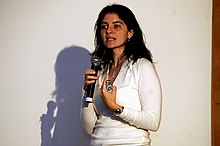Loading AI tools
Brazilian neuroscientist From Wikipedia, the free encyclopedia
Suzana Herculano-Houzel (born 1972) is a Brazilian neuroscientist. Her main field of work is comparative neuroanatomy; her findings include a method of counting neurons in human and other animals' brains[1] and the relation between the cerebral cortex area and the thickness and number of cortical folds.[2]
Suzana Herculano-Houzel | |
|---|---|
 | |
| Born | Suzana Carvalho Herculano 1972 (age 51–52) Rio de Janeiro, Brazil |
| Alma mater | Case Western Reserve University Pierre and Marie Curie University Max Planck Institute Federal University of Rio de Janeiro |
| Scientific career | |
| Fields | Neuroscience |
| Institutions | Vanderbilt University |
Suzana Herculano-Houzel was born in 1972 in Rio de Janeiro. She graduated in biology at the Federal University of Rio de Janeiro (1992), took a master's degree at Case Western Reserve (1995), and a doctorate in neuroscience at Paris VI University (1999). She was also a post-doctoral fellow at the Max Planck Institute for Brain Research.
Herculano-Houzel was a faculty member at the Federal University of Rio de Janeiro from 2002 to May 2016, when she moved to Vanderbilt University.[3]
She published books on popularization of science and writes columns for Folha de S.Paulo newspaper and Scientific American Brazil magazine. She was the first Brazilian speaker on TED Global in 2013.[4][5]
She won the José Reis Prize for Science Communication in 2004.
Seamless Wikipedia browsing. On steroids.
Every time you click a link to Wikipedia, Wiktionary or Wikiquote in your browser's search results, it will show the modern Wikiwand interface.
Wikiwand extension is a five stars, simple, with minimum permission required to keep your browsing private, safe and transparent.